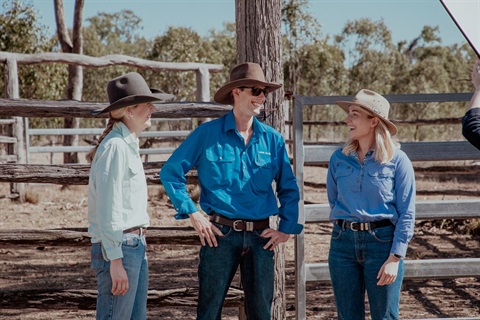Modern slavery is a complex global problem, breaching the most fundamental freedoms and human rights of individuals. However unearthing links to modern slavery can be difficult, especially within complex organisations such as universities.
Our 2021 Modern Slavery Statement (PDF, 3059 KB) – that we, alongside many other organisations, are required to publish under the Modern Slavery Act – provides a detailed account of actions we have taken to identify and address modern slavery risks in our operations and supply chains over the past year. This includes establishing the Modern Slavery Unit, a dedicated expert team within the Office of the Provost and Deputy Vice Chancellor providing a University-wide strategic approach for addressing modern slavery and driving collaboration across government, business and civil society to build the knowledge base and tools needed to generate transformative change.
The University of Sydney’s Vice-Chancellor and President, Professor Mark Scott, said the University has a crucially important leadership role to play in addressing the global issue of modern slavery.
This is why we exist, to improve the world around us through education and leadership.
“While slavery is an old problem, the due diligence required to combat modern slavery is a new and fast emerging field,” Professor Scott said.
“And the complex nature of this serious issue means collective action across sectors will be needed to truly effect change. The new federal government has recognised this and has committed to strengthening the Modern Slavery Act and appointing an Anti-Slavery Commissioner to ensure compliance and improve transparency of supply chains.
“By collaborating within the sector and beyond – with government, business and civil society – the university sector can also collectively become a gold standard sector in tackling global problems such as modern slavery. This is why we exist, to improve the world around us through education and leadership.
“I’m very proud of how Sydney has embraced this prime opportunity to demonstrate leadership for good while solving real world problems.”
Our Sydney Modern Slavery Due Diligence Model
Provost and Deputy Vice-Chancellor Professor Annamarie Jagose said a critical early step had been to develop our Sydney Modern Slavery Due Diligence Model, which is supported by a practically-oriented policy and processes that have been adopted beyond the University.
“Society is calling upon large organisations such as ours to contribute to solving the global challenges of our time – from environmental issues such as climate change to social problems including economic inequality and modern slavery,” Professor Jagose said.
“From mapping modern slavery in global supply chains through our OASSIS research project, to establishing the world’s first Financial Sector Human Rights Benchmark, the University of Sydney is well placed to contribute to global understandings of modern slavery and provide practical solutions to a global issue.
“Our new model provides another powerful opportunity to use our influence and to partner within and beyond the sector to effect change.”
The University of Sydney’s General Counsel, Olivia Perks, said the model provided a clear example of the opportunity for the sector to go beyond legal compliance and play a much-needed role in solving the global problem of modern slavery.
“Analysis by the Human Rights Law Centre of 102 Australian companies found 77 percent of companies had failed to comply with the basic reporting requirements mandated by the legislation; 52 percent had failed to identify obvious modern slavery risks in their operations or supply chains; and just 27 percent of companies appeared to be taking some form of effective action to address modern slavery risks,” Ms Perks said.
“This tells us organisations are struggling to understand their operational and supply chain links to modern slavery risks and consequently, not identifying the appropriate levers in their control to address those risks.
“We have a lot to offer in terms of practical solutions to developing a deeper and more nuanced understanding of modern slavery risks, as our due diligence model demonstrates.”

At this year’s Welcome Week for commencing students, the University of Sydney collaborated with Anti-Slavery Australia to host a Human Mart Exhibition on campus, an art installation that shines a light on the human stories behind the modern slavery statistics in Australia. L-R: General Counsel Olivia Perks, Vice-Chancellor and President Professor Mark Scott, Director Anti-Slavery Australia Jennifer Burn, Modern Slavery Ethical and Sustainable Supply Chain Manager Philip Chan, Director Modern Slavery Unit Esty Marcu.
“Authentic and meaningful action”
While more research and clear methodology is needed to assess the collective real impact and effectiveness of measures to address and prevent modern slavery, the University’s model and approach has been recognised as sector leading by organisations such as the UN Global Compact, Anti-Slavery Australia, and human rights leading law firm Corrs Chambers.
Dr David Cooke, Australia Chair UN Global Compact, said the University’s statement demonstrated a strong commitment to human rights, not only to protect vulnerable student populations but everyone touched by the University’s operations.
“The decision to roll out mandatory training to all staff (I believe the first university to do so) and the focus on high standards of due diligence concerning procurement, partnerships, research funding and other areas of collaboration demonstrate authentic and meaningful action. It is my hope that other institutions of learning will seek to emulate the University.”
Anti-Slavery Australia Director, and former NSW Interim Anti-Slavery Commissioner, Professor Jennifer Burn, said the University of Sydney had really differentiated itself in looking beyond supply chains and identifying sector-specific risks such as modern slavery risks linked to certain research activities.
“Modern slavery is often seen as a supply chain or procurement issue, but it’s much more pervasive than that, especially in the higher education sector where certain types of research activities have been directly linked to human rights violations. These are important and complex risks for the sector to address in collaboration with government, civil society and business. The Sydney model can help guide other universities – and other organisations more broadly – to do just that.”







